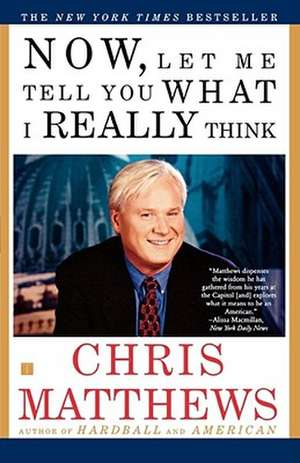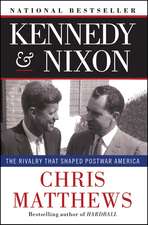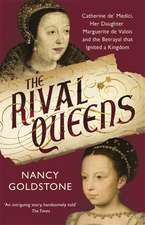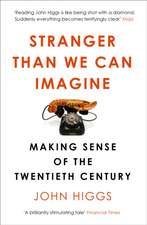Now, Let Me Tell You What I Really Think
Autor Chris Matthewsen Limba Engleză Paperback – 2 sep 2002
Chris Matthews has been playing "hardball" since the day he was born. From his first political run-in in the first grade to his years working as presidential speechwriter for Jimmy Carter, Matthews grew up loving his country and dreaming of his chance to protect it. In Now, Let Me Tell You What I Really Think, Chris Matthews is at his brilliant, blunt, bulldogged best.
From the Cold War to the Clinton years, Matthews gives the straight-up account of what it means to be an American. Matthews tells us about his "God and Country" Catholic school education in Philadelphia, complete with Cold War air-raid drills, and his early enthusiasm for politics. He shares with us his life's adventures -- two years in Africa with the Peace Corps, the challenge of running for Congress in his twenties, and his three decades deep in the "belly of the beast" of American politics -- using his own experiences to give us an irreverent look at who we are and whom we trust to lead us.
Preț: 90.39 lei
Nou
Puncte Express: 136
Preț estimativ în valută:
17.30€ • 18.10$ • 14.40£
17.30€ • 18.10$ • 14.40£
Carte disponibilă
Livrare economică 10-24 martie
Preluare comenzi: 021 569.72.76
Specificații
ISBN-13: 9780684862354
ISBN-10: 0684862352
Pagini: 224
Dimensiuni: 140 x 214 x 15 mm
Greutate: 0.21 kg
Editura: Free Press
Colecția Free Press
ISBN-10: 0684862352
Pagini: 224
Dimensiuni: 140 x 214 x 15 mm
Greutate: 0.21 kg
Editura: Free Press
Colecția Free Press
Extras
Chapter One: An American Attitude
It was October 18, 2000, the morning after the third and final Gore-Bush debate. I was invited on the Today show to offer my political analysis of who had won. Gore had already declared his previous night's performance to be his "Goldilocks" debate: "The first was too hot. The second was too cool. The third was just right." And his fairy-tale verdict had gone unchallenged by the media. Until Matt Lauer asked me what I thought.
Here's what I said: "I think Gore was more aggressive last night, and if you look at the polls, he won on a couple of points. But clearly the interesting question again is, Who do you like? Bush won."
Matt Lauer leaped on me like a cougar from a tree: "Let's be honest here, you've been saying that all along. Al Gore irritates you."
Me: "The public has been saying that too."
Matt (a second time): "Al Gore irritates you."
Me (again): "The public has been saying that too."
Matt: "But you just don't like Al Gore's style, and it's very hard for you to look past it."
Me: "No, no. I think the interesting thing is -- I've been studying this election for about a year now -- the economy should get the incumbent elected. Gore should win. The issue agenda -- prescription drugs and those kinds of issues -- are all working for the incumbent administration. So what's stopping the American people? There's some tissue rejection there about Al Gore, something that stops them from saying, 'Okay...Gore.' I think the American people have a problem with him."
Matt: "So let's be clear..."
Me: "They may resolve it. They may say he's better than the other guy."
Matt: "But the American people also haven't taken to George W. Bush."
Me: "That's true, because he's not prepared to be president in many ways."
Matt: "Well, that's a pretty bold statement you just said."
Me: "I think there's a problem between a guy they know who loves government too much and a guy who doesn't know government too much. And they have to choose between two very incomplete candidates. This is not the heavyweight championship here."
Matt Lauer's resistance to my verdict confirmed what I had suspected walking into 30 Rockefeller Plaza that morning. The media cognoscenti had made their call: Gore had not only won, he had cleaned Bush's clock! For Matt certainly was not alone in his thinking. The New York Times ruled that the Democratic candidate "dominated" the debate. Its lead editorial called Gore the "aggressor and pace-setter" of the evening who "seemed to throw Mr. Bush off balance." The Washington Post's Tom Shales, the top TV columnist in the country, called it Gore's "best performance." Times columnist William Safire, a conser-vative, agreed that Gore "came on strong." Soon, the internal buzz at NBC was that I had been expressing opinion rather than analysis. The implication was that I was being biased. How could anyone who had declared that George W. had "won" that debate not be?
I'll tell you how.
Right after Gore's "Goldilocks" performance, pollster Frank Luntz, who MSNBC had hired for the 2000 election, met with thirty-six "undecided" voters. Thirty of those thirty-six "liked" George Bush better than his rival. A Gallup Poll taken immediately after the debate found that slightly more people (46 to 44 percent) judged Gore the better debater. But, by 60 to 31 percent -- two to one! -- they said Bush was more "likeable." By the same two-to-one ratio, the public judged Gore to be the "unfair" debater. Bush also was viewed as more "believable" than Gore.
Watching the night before, I, too, thought Gore had turned in his best performance. But after seeing the reactions from the Luntz focus group and the Gallup Poll I realized that Gore's reflexive arrogance, which I had witnessed personally so many times before, was now, after three primetime exposures, turning off the heartland voter. Matt was right. Gore's negative campaigning had long irritated me. The polling now told me it was also irritating much of the country.
The reason Bush is the president today is simple: When millions of voters saw Al Gore campaigning and in the debates, they took away an impression of negativity and condescension. They decided that they would have to go with the unproven, as Gore would say, "risky" alternative. The debate audience preferred the notion of having a guy in the White House who often spoke English as if it were his second language to one who spoke to us as if English were our second language.
In turned out that George W. Bush "won" that debate even more decisively than, forty years earlier, Jack Kennedy had beaten Richard Nixon. The proof was in the polls. Gore led Bush by 47 to 44 percent in the Gallup during the thirty days prior to the debates. He fell behind Bush 47 to 43 percent in the fifteen days after.
The Gore people had thought their man's performance in the third debate would be the deal maker. With the strong economy at his back, the Democratic vice-president would overtake the rival he and much of the media dismissed as a know-nothing frat boy and go on to score a clear-cut victory in November.
They were wrong. The candidate with the undeniable bragging rights on the economic front tripped over his own I-know-best personality. The debates for which Gore had lusted ended up giving Bush the momentum. Had the Texas governor not suffered a pair of postdebate stumbles -- an out-of-the-past leak of an old driving-under-the-influence charge and a lamebrained claim that Social Security was not a federal program -- he would have ridden that Big Mo right through to election day.
Instead, Bush lost the popular vote, needed the intervention of the Supreme Court to win in the Electoral College, and inherited a country that would remain as politically divided as it had shown itself that first week in November 2000.
Here's What I Really Think: Al Gore lost one presidential election and may well lose another because of who he is and who we are. I think there's such a thing as an American attitude. It manifests itself in the candidates we like and in those we don't. Just as a human being possesses a soul as well as a body, this country has a spirit as well as a geography. You're ill-advised to tread on us, our self-respect, or our Social Security.
Above all, we Americans are an optimistic, democratic people. We will forgive just about everything from our politicians but condescension. Al Gore did worse than lie to us. He talked down to us.
He's not alone. The Democrats don't have a monopoly on this crap. What about Dick Cheney cooking up energy policy in secret meetings with the oil boys? Locked doors, a bunch of policy wonks around the table, each pushing his agenda and ideology. Sounds like Hillary's recipe for health care. I don't like watching either party playing Father -- or Mother -- knows best.
This political assessment wasn't cultivated in a petri dish. It comes from thirty years that were roughly divided between working for politicians and covering them. Even as an insider I kept an outsider's attitude. When I wrote speeches for President Carter, my drinking buddies taunted me during the yearlong humiliation of the Iranian hostage crisis. When I worked as right-hand man for Tip O'Neill, I never forgot how much I had liked Ronald Reagan all those years on GE Theater. But before all that, I grew up in the America I talk and write about -- in a family that, to use a discarded Clinton line, worked hard and played by the rules. Dad was intensely self-reliant. Mom was just as intensely suspicious of the country's cultural elite. My family background is as much a part of my political commentary as what I see in Washington.
It's what I know of this real America that fills these pages. The big fights today are not about economics -- we pretty much agree on things like balanced budgets and free trade. It's not even about the usual laundry list of issues the politicians mentally -- or literally -- pull out of their pockets when asked what the next election is all about.
It's about this attitude of ours.
When you think about it, we Americans are different. That word "freedom" isn't just in our documents; it's in our cowboy souls. We are the most freedom-loving people in the world. We'd rather have guns than live under a government powerful enough to collect them all. We regularly say "no" to a British-style national health system, fearing it means a regime of long lines to see strange doctors. Many people with grave concerns about abortion would rather see women individually decide the matter rather than live under a government repressive enough to deny them the freedom to decide.
Nor are we Americans as cynical as some older cultures. After more than two hundred years of existence in a complex world, we continue to see life as a battle between the good guys and the bad guys. That's one reason Europeans love looking down on us. Why can't we be more sophisticated, more worldly? Yet it is that very good guys versus bad guys mindset of ours that the same Europeans call upon when they face a real bad guy like Hitler or Stalin or Milosevic.
I know that mindset firsthand. My first job when I came to Washington three decades ago was as a .38-caliber-toting officer of the U.S. Capitol Police. It was in the old days when senators and members of Congress used the police jobs as patronage. Some of the slots went to sons of political pals so that these fortunate fellows could go to law school in D.C. My 3:00 to 11:00 P.M. shift was payback for working in a U.S. senator's office writing speeches and answering letters during the daytime.
But the core of the force was made up of lifers from the military, enlisted guys who'd done long hitches with the Army, Navy, or Marines.
I'd spend hours hanging out with these guys. My favorite was Sergeant Leroy Taylor. He was one of those citizen-philosophers who instinctively grasped this country's real politics, the kind that people live and are ready to die for. He and the other country boys would talk about how they would do anything to defend the Capitol. More than some of the big-shot elected officials, my colleagues in blue revered the place and what it meant to the republic. It wasn't about them, but about something much bigger.
I will never forget what Leroy once told me and the wisdom it contained: "The little man loves his country, Chris, because it's all he's got."
I have never heard a better rendition of what I see as our unique American attitude. Or a sharper measure of the distance ordinary people feel from the economic and educated elites. Or a finer explanation of why, even with last year's then still-booming economy as his trump card, Al Gore isn't in the White House. Or why, when a real political gusher blows in this country, the establishment's finest always will be the last to yell. Or why, thank God, a guy with a partisan rap sheet like mine has earned the trust of so many conservatives, independents, and liberals as well who, like me, know just what Leroy Taylor was talking about.
Copyright © 2001 by Christopher Matthews
It was October 18, 2000, the morning after the third and final Gore-Bush debate. I was invited on the Today show to offer my political analysis of who had won. Gore had already declared his previous night's performance to be his "Goldilocks" debate: "The first was too hot. The second was too cool. The third was just right." And his fairy-tale verdict had gone unchallenged by the media. Until Matt Lauer asked me what I thought.
Here's what I said: "I think Gore was more aggressive last night, and if you look at the polls, he won on a couple of points. But clearly the interesting question again is, Who do you like? Bush won."
Matt Lauer leaped on me like a cougar from a tree: "Let's be honest here, you've been saying that all along. Al Gore irritates you."
Me: "The public has been saying that too."
Matt (a second time): "Al Gore irritates you."
Me (again): "The public has been saying that too."
Matt: "But you just don't like Al Gore's style, and it's very hard for you to look past it."
Me: "No, no. I think the interesting thing is -- I've been studying this election for about a year now -- the economy should get the incumbent elected. Gore should win. The issue agenda -- prescription drugs and those kinds of issues -- are all working for the incumbent administration. So what's stopping the American people? There's some tissue rejection there about Al Gore, something that stops them from saying, 'Okay...Gore.' I think the American people have a problem with him."
Matt: "So let's be clear..."
Me: "They may resolve it. They may say he's better than the other guy."
Matt: "But the American people also haven't taken to George W. Bush."
Me: "That's true, because he's not prepared to be president in many ways."
Matt: "Well, that's a pretty bold statement you just said."
Me: "I think there's a problem between a guy they know who loves government too much and a guy who doesn't know government too much. And they have to choose between two very incomplete candidates. This is not the heavyweight championship here."
Matt Lauer's resistance to my verdict confirmed what I had suspected walking into 30 Rockefeller Plaza that morning. The media cognoscenti had made their call: Gore had not only won, he had cleaned Bush's clock! For Matt certainly was not alone in his thinking. The New York Times ruled that the Democratic candidate "dominated" the debate. Its lead editorial called Gore the "aggressor and pace-setter" of the evening who "seemed to throw Mr. Bush off balance." The Washington Post's Tom Shales, the top TV columnist in the country, called it Gore's "best performance." Times columnist William Safire, a conser-vative, agreed that Gore "came on strong." Soon, the internal buzz at NBC was that I had been expressing opinion rather than analysis. The implication was that I was being biased. How could anyone who had declared that George W. had "won" that debate not be?
I'll tell you how.
Right after Gore's "Goldilocks" performance, pollster Frank Luntz, who MSNBC had hired for the 2000 election, met with thirty-six "undecided" voters. Thirty of those thirty-six "liked" George Bush better than his rival. A Gallup Poll taken immediately after the debate found that slightly more people (46 to 44 percent) judged Gore the better debater. But, by 60 to 31 percent -- two to one! -- they said Bush was more "likeable." By the same two-to-one ratio, the public judged Gore to be the "unfair" debater. Bush also was viewed as more "believable" than Gore.
Watching the night before, I, too, thought Gore had turned in his best performance. But after seeing the reactions from the Luntz focus group and the Gallup Poll I realized that Gore's reflexive arrogance, which I had witnessed personally so many times before, was now, after three primetime exposures, turning off the heartland voter. Matt was right. Gore's negative campaigning had long irritated me. The polling now told me it was also irritating much of the country.
The reason Bush is the president today is simple: When millions of voters saw Al Gore campaigning and in the debates, they took away an impression of negativity and condescension. They decided that they would have to go with the unproven, as Gore would say, "risky" alternative. The debate audience preferred the notion of having a guy in the White House who often spoke English as if it were his second language to one who spoke to us as if English were our second language.
In turned out that George W. Bush "won" that debate even more decisively than, forty years earlier, Jack Kennedy had beaten Richard Nixon. The proof was in the polls. Gore led Bush by 47 to 44 percent in the Gallup during the thirty days prior to the debates. He fell behind Bush 47 to 43 percent in the fifteen days after.
The Gore people had thought their man's performance in the third debate would be the deal maker. With the strong economy at his back, the Democratic vice-president would overtake the rival he and much of the media dismissed as a know-nothing frat boy and go on to score a clear-cut victory in November.
They were wrong. The candidate with the undeniable bragging rights on the economic front tripped over his own I-know-best personality. The debates for which Gore had lusted ended up giving Bush the momentum. Had the Texas governor not suffered a pair of postdebate stumbles -- an out-of-the-past leak of an old driving-under-the-influence charge and a lamebrained claim that Social Security was not a federal program -- he would have ridden that Big Mo right through to election day.
Instead, Bush lost the popular vote, needed the intervention of the Supreme Court to win in the Electoral College, and inherited a country that would remain as politically divided as it had shown itself that first week in November 2000.
Here's What I Really Think: Al Gore lost one presidential election and may well lose another because of who he is and who we are. I think there's such a thing as an American attitude. It manifests itself in the candidates we like and in those we don't. Just as a human being possesses a soul as well as a body, this country has a spirit as well as a geography. You're ill-advised to tread on us, our self-respect, or our Social Security.
Above all, we Americans are an optimistic, democratic people. We will forgive just about everything from our politicians but condescension. Al Gore did worse than lie to us. He talked down to us.
He's not alone. The Democrats don't have a monopoly on this crap. What about Dick Cheney cooking up energy policy in secret meetings with the oil boys? Locked doors, a bunch of policy wonks around the table, each pushing his agenda and ideology. Sounds like Hillary's recipe for health care. I don't like watching either party playing Father -- or Mother -- knows best.
This political assessment wasn't cultivated in a petri dish. It comes from thirty years that were roughly divided between working for politicians and covering them. Even as an insider I kept an outsider's attitude. When I wrote speeches for President Carter, my drinking buddies taunted me during the yearlong humiliation of the Iranian hostage crisis. When I worked as right-hand man for Tip O'Neill, I never forgot how much I had liked Ronald Reagan all those years on GE Theater. But before all that, I grew up in the America I talk and write about -- in a family that, to use a discarded Clinton line, worked hard and played by the rules. Dad was intensely self-reliant. Mom was just as intensely suspicious of the country's cultural elite. My family background is as much a part of my political commentary as what I see in Washington.
It's what I know of this real America that fills these pages. The big fights today are not about economics -- we pretty much agree on things like balanced budgets and free trade. It's not even about the usual laundry list of issues the politicians mentally -- or literally -- pull out of their pockets when asked what the next election is all about.
It's about this attitude of ours.
When you think about it, we Americans are different. That word "freedom" isn't just in our documents; it's in our cowboy souls. We are the most freedom-loving people in the world. We'd rather have guns than live under a government powerful enough to collect them all. We regularly say "no" to a British-style national health system, fearing it means a regime of long lines to see strange doctors. Many people with grave concerns about abortion would rather see women individually decide the matter rather than live under a government repressive enough to deny them the freedom to decide.
Nor are we Americans as cynical as some older cultures. After more than two hundred years of existence in a complex world, we continue to see life as a battle between the good guys and the bad guys. That's one reason Europeans love looking down on us. Why can't we be more sophisticated, more worldly? Yet it is that very good guys versus bad guys mindset of ours that the same Europeans call upon when they face a real bad guy like Hitler or Stalin or Milosevic.
I know that mindset firsthand. My first job when I came to Washington three decades ago was as a .38-caliber-toting officer of the U.S. Capitol Police. It was in the old days when senators and members of Congress used the police jobs as patronage. Some of the slots went to sons of political pals so that these fortunate fellows could go to law school in D.C. My 3:00 to 11:00 P.M. shift was payback for working in a U.S. senator's office writing speeches and answering letters during the daytime.
But the core of the force was made up of lifers from the military, enlisted guys who'd done long hitches with the Army, Navy, or Marines.
I'd spend hours hanging out with these guys. My favorite was Sergeant Leroy Taylor. He was one of those citizen-philosophers who instinctively grasped this country's real politics, the kind that people live and are ready to die for. He and the other country boys would talk about how they would do anything to defend the Capitol. More than some of the big-shot elected officials, my colleagues in blue revered the place and what it meant to the republic. It wasn't about them, but about something much bigger.
I will never forget what Leroy once told me and the wisdom it contained: "The little man loves his country, Chris, because it's all he's got."
I have never heard a better rendition of what I see as our unique American attitude. Or a sharper measure of the distance ordinary people feel from the economic and educated elites. Or a finer explanation of why, even with last year's then still-booming economy as his trump card, Al Gore isn't in the White House. Or why, when a real political gusher blows in this country, the establishment's finest always will be the last to yell. Or why, thank God, a guy with a partisan rap sheet like mine has earned the trust of so many conservatives, independents, and liberals as well who, like me, know just what Leroy Taylor was talking about.
Copyright © 2001 by Christopher Matthews
Cuprins
Contents
This Country
Introduction: Why I Interrupt
1. An American Attitude
George W. Bush
2. The Man with the Sun in His Face
Al Gore
3. God and Country
Bill Clinton
4. People Who Work Hard and Play by the Rules
John F. Kennedy
5. Freedom Is Contagious
Winston Churchill
6. Common Ground
7. "The Worst Form of Government"
Tip O'Neill
8. Truth
Ronald Reagan
9. Worldly Wisdom
10. Playing Hardball
This Country
Introduction: Why I Interrupt
1. An American Attitude
George W. Bush
2. The Man with the Sun in His Face
Al Gore
3. God and Country
Bill Clinton
4. People Who Work Hard and Play by the Rules
John F. Kennedy
5. Freedom Is Contagious
Winston Churchill
6. Common Ground
7. "The Worst Form of Government"
Tip O'Neill
8. Truth
Ronald Reagan
9. Worldly Wisdom
10. Playing Hardball
Recenzii
Alissa Macmillan New York Daily News Matthews dispenses the wisdom he has gathered from his years at the Capitol [and] explores what it means to be an American.
The Washington Post A collection of reflections, aphorisms, and reminiscences for political junkies curious about the thinking, and the life, behind the drive-by quips that Matthews regularly delivers on his cable talk show Hardball.
The Washington Post A collection of reflections, aphorisms, and reminiscences for political junkies curious about the thinking, and the life, behind the drive-by quips that Matthews regularly delivers on his cable talk show Hardball.
Descriere
Perfectly timed to explore society's changing sensibility about patriotism, "Hardball" host and Washington insider Matthews gives Bill O'Reilly a run for his money with this straight-up account of what it really means to be an American.









